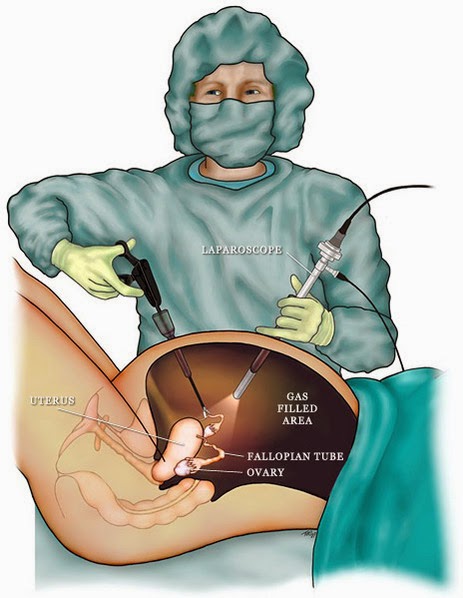Surgery Inc
Organ Removal for "Cancer
Prevention"
SURGICAL MUTILATION AND MIND CONTROL - DOCTORS WILL "CUT
THE RISK OF OVARIAN CANCER" BY REMOVING HEALTHY FALLOPIAN TUBES
Jeanice Barcelo
MONDAY, NOVEMBER 24, 2014

Friends - this is the kind of insidious psychosis you can only find amongst the
satanic illuminati. What follows is a description of a diabolical obstetrical
plan to mutilate and sterilize mass numbers of women under the guise of
"protecting" them. But The Truth is, the dark forces are intending to use
surgical mutilation as a form of social control. Kerth Barker, who is a survivor
of satanic ritual abuse and the author of several books including Angelic
Defenders and Demonic Abusers, has shared:
"...What you have to understand is that all of this
relates to a plan to create an apocalypse. The Illuminati has a depopulation
agenda. They plan to kill off most of the people on the planet so that only
half a billion people remain. This isn't to be done to save the environment,
they want to do it to turn the planet into a giant Satanic prison.
In order to push forward their massive depopulation agenda, they need to
have complete control over their own Illuminati members. And even in the
Illuminati system, most members would not necessarily cooperate with the
massive genocide that is being planned. Although Illuminati mind control is
pretty sophisticated, it does have certain limits. Persons who have been
subjected to Monarch mind control may be used as sex slaves, assassins or
even entertainment performers. But none of those things require great
intellectual skill. It turns out that computer programmers and social
organizers don't do well when subjected to this type of trauma-based mind
control. So the problem that the Committee faces is how they can have
complete control over their intellectual human resources.
The solution that they've come up with is to combine surgical mutilation
with certain forms of indoctrination. What they believe is that when
surgical mutilation is combined with indoctrination, such persons can retain
their intellectual capacity while becoming completely submissive to their
masters. What Illuminati psychiatrists believe is that when a person is
subjected to extreme surgical mutilation, this creates a permanent feeling
of powerlessness. So when such a person is then subjected to indoctrination,
that person will accept the indoctrination more willingly..."
Keeping this information in mind, we can easily discern
what the real agenda is behind the idea to remove women's healthy reproductive
organs. Remember -- the removal of any organ will alter the entire system. Every
part of the body is interdependent and interconnected. For true health and
well-being, we need ALL our body parts. While it may be necessary in some cases
to remove an organ if the organ is diseased, the fact that medical professionals
are now promotig the idea of removing healthy reproductive organs from healthy
women is a sign of diabolical medical insanity.
Below you will find an article about their intentions as well as some
information about long-term problems after this type of surgery.
Also note -- even Disney is now promoting the normalization of surgical
mutilation through images like these...

'Disney Princesses' Show Off Breast Cancer Scars in Artist's New Work
Photo Credit: https://www.yahoo.com/health/disney-princesses-show-off-breast-cancer-scars-in-101856171237.html
Source Article:
Doctors explain how they will cut the risk of ovarian cancer
http://yournewswire.com/doctors-explain-how-they-will-cut-the-risk-of-ovarian-cancer/
Specialists at the Royal College of Obstetricians and
Gynaecologists are calling for national guidelines to protect women by removal
of the fallopian tubes.
Women who have completed their family should be offered the chance to have their
fallopian tubes removed to cut risk of ovarian cancer
The Mail Online reports: the impact could be huge – reducing the risk of the
most serious type of ovarian cancer by almost two-thirds for women in their 40s
and 50s, it is claimed.
Ovarian cancer affects almost 7,000 women a year, and kills more than 4,000,
often because it has spread with few or no obvious symptoms before diagnosis.
Specialists at the Royal College of Obstetricians and Gynaecologists are now
calling for national guidelines to protect women by removal of the fallopian
tubes, where ovarian cancer starts in more than 70 per cent of cases.
Women at high risk of the disease because they have a BRCA 1 genetic mutation
are already advised to have both their fallopian tubes and their ovaries removed
as a preventive measure.
But around two-thirds of women who develop ovarian cancer are deemed ‘low risk’
with no family history.
These women become increasingly likely to develop the disease, because it is
most common around the age of 60. So removing the fallopian tubes when they have
completed their families, probably in their 40s and 50s, could protect the vast
majority.
The ovaries would be left intact because their removal would trigger an early
menopause but offer no further protection.
Dr Ian Harley, of the Northern Ireland Regional Oncology Centre in Belfast, and
lead-author of the paper, said: ‘Being pro-active and if the opportunity arises
among women who have completed their families, removal of the fallopian tubes
could help reduce the incidence of ovarian cancer.
‘Removal of the fallopian tubes during surgery for other conditions carries
minimal additional surgical risk to the patient.’
He said some gynaecologists already suggest this course of action to women who
are going to have a hysterectomy, or other gynaecological operations, to be
performed at the same time.
In future, women could be offered the chance to have their fallopian tubes
removed when they were, for example, having their gall-bladder out. Dr Harley
said: ‘Much evidence supports the theory that ovarian high-grade serous
carcinomas arise from the fallopian tube and we now know much more about the
genetic makeup.
‘There has been little improvement in survival from this cancer, which is the
leading cause of death from gynaecological cancers among women in the UK.’
He said more evidence is needed from ongoing trials but results so far suggest
the risk of developing ovarian cancer would be cut by at least 60 per cent in
women with no family history.
The latest evidence is presented in a new Scientific Impact Paper published
today by the RCOG’s scientific advisory committee.
The aim is to use the paper as the basis for new guidelines to be drawn up by
the National Institute for Health and Care Excellence (Nice), or the RCOG, to
make the practice more accepted, Dr Harley said. It is already being used widely
in British Columbia, Canada, he added.
Dr Sadaf Ghaem-Maghami, chairman of the RCOG’s scientific advisory committee,
said: ‘Ovarian cancer affects more than 6,500 women in the UK each year and is
the fifth most common cancer among women.
‘The identification of the fallopian tube as the origin of high-grade pelvic
serous carcinomas has the potential to have significant clinical impact on the
reduction of mortality associated with ovarian cancer.’
Here are some of the known
problems women experience after this type of surgery:
Fertility Issues
The fallopian tubes are an important part of a woman’s reproductive system, and
removal often has serious ramifications on fertility. The tubes connect the
ovaries, where the eggs are produced, to the uterus. When they are gone, eggs
have no way of getting to the uterus, which means that they have no way of
meeting a sperm, getting fertilized, and implanting. Surgery removing both tubes
renders a woman completely infertile. Taking one diminishes her chances to
become pregnant naturally, but still leaves the possibility open. As long as a
woman still has a healthy uterus she may be able to conceive through in vitro
fertilization, but this can be costly and invasive.
In some cases, though, partial tube removal can actually help natural
conception. This is usually the case when cysts, scar tissue, or other growths
are blocking a portion of the tube, making it difficult or impossible for eggs
to get past. In these procedures surgeons remove the damaged or defective
portions, but then reconnect the tissues; the result is a shorter, but
functional, tube.
Hormone Imbalance
Total tube removal often includes the ovaries, since the two are connected. When
a woman loses her ovaries she also loses a major hormone regulator, and as a
result she is likely to experience mood swings and wild fluctuations in her
hormone levels, at least at first. The removal of both ovaries usually triggers
menopause regardless of the patient’s age. Menopause is basically the body’s way
of shutting down its reproductive functions, but the change is often accompanied
by surges and drops in estrogen, testosterone, and other sex hormones.
Osteoporosis and Heart Concerns
A sudden loss of estrogen has been connected to a heightened risk for heart
disease, which is something women who are thinking about elective tube removal
should consider. Post-menopausal women are also usually at a higher risk for
osteoporosis, or bone weakening. Both of these risks can be lessened with
certain medications, supplements, and exercises, but they can mean lifestyle
changes for patients.
- Source: What
Are the Pros and Cons of Fallopian Tube Removal?
http://birthofanewearth.blogspot.co.uk/2014/11/surgical-mutilation-and-mind-control.html
See:
[2015 March] Beware of Organ Removal for
"Cancer Prevention": Jolie's Precautionary Tale

